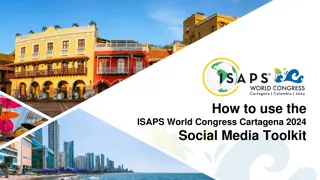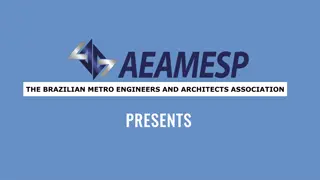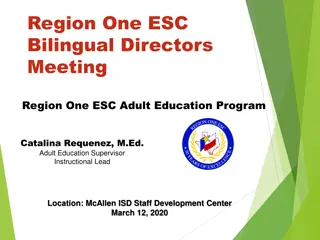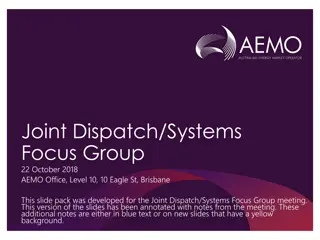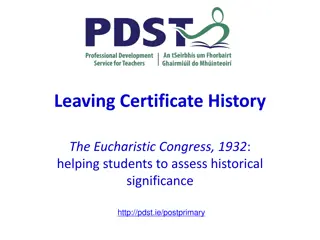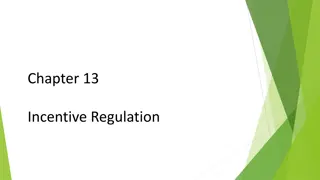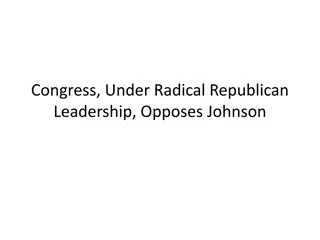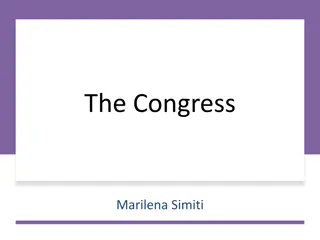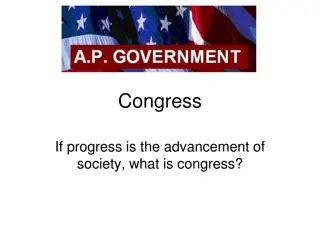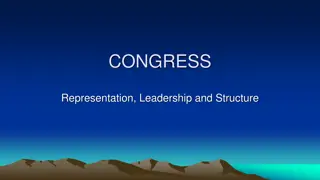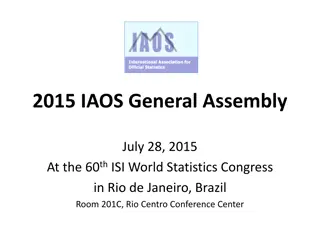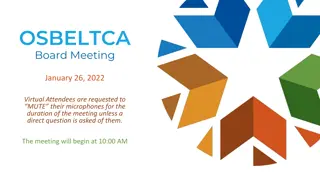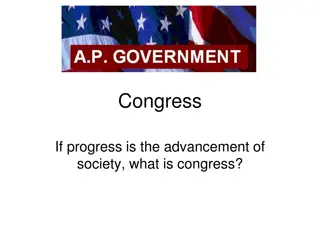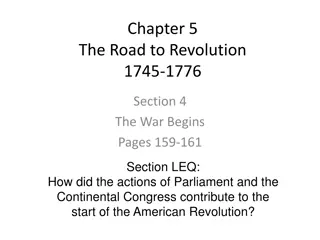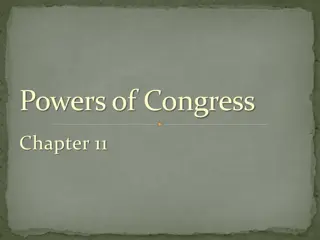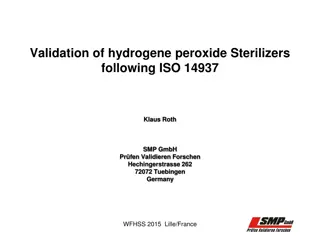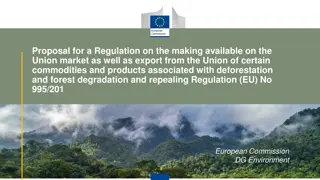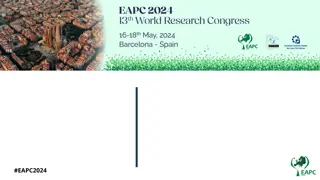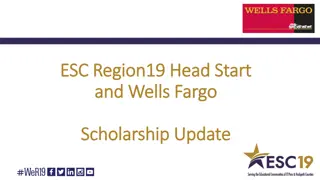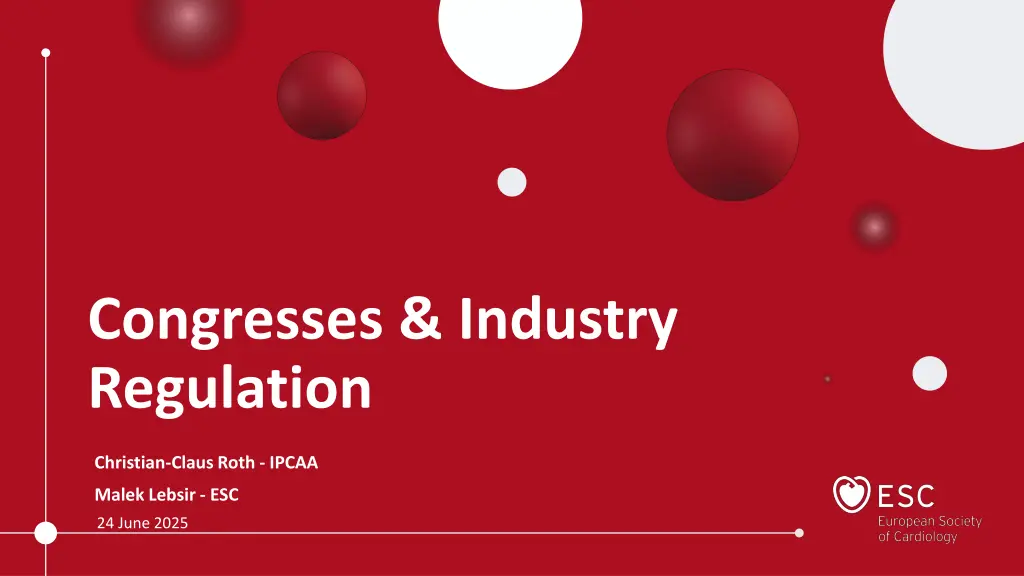
Unified Rules for Congress Industry Regulation
Explore the challenges and special measures implemented in congress industry regulation, focusing on attendee categorization, regulatory compliance, and ethical considerations. Learn about the aim for clearer and harmonized rules across Europe, emphasizing attendee categories and rules of engagement. Follow the evolution of codes to reflect emerging roles and refine rules for non-public events to ensure proportional access and adherence to regulations.
Download Presentation

Please find below an Image/Link to download the presentation.
The content on the website is provided AS IS for your information and personal use only. It may not be sold, licensed, or shared on other websites without obtaining consent from the author. If you encounter any issues during the download, it is possible that the publisher has removed the file from their server.
You are allowed to download the files provided on this website for personal or commercial use, subject to the condition that they are used lawfully. All files are the property of their respective owners.
The content on the website is provided AS IS for your information and personal use only. It may not be sold, licensed, or shared on other websites without obtaining consent from the author.
E N D
Presentation Transcript
Congresses & Industry Regulation Christian-Claus Roth - IPCAA Malek Lebsir - ESC 24 June 2025
Context - Regulation Industry Self-regulatory bodies Harmonised legal basis transposed by each member state Each country adapts the directive with its own enforcement rules Try answering Industry and audience stake. Stricter regulation apply
Context what is a congress Participants Faculty Delegates Exhibitors Cardios, Neuros, GPs Press Cardios, Neuros, GPs, Nurses & APs Device, Pharma, Imaging Press Nurses & AP Med. Students Digital Health Health Eco, Patients, Digital Health Experts Med. Students < graduated Associations 96% Publishers / Press Industry Reps of floor space Politicians Data Scientists, Health Authorities Staff & Suppliers Audience
2024 Unexpected Challenges Concerns raised by pharmaceutical industry partners regarding attendee categorization and minoritees Questions about the inclusion of patients, media, medical students, and other non-traditional faculty/attendees. Uncertainty around regulatory compliance and ethical considerations
2025 Special measures No More Lecture Rooms Within the Exhibition Area Exhibition Access Must Be Optional Mandatory Disclaimer at Registration All non-HCPs must agree not to access the Exhibition Area or Industry Sessions. Exception: Company staff involved in session organization. ? Visual Identification Orange badge tags assigned to non-HCPs. Used for quick identification by staff and entrance controllers. Exhibition Area Access Control Signage at all exhibition entrances clearly states: Access restricted to Healthcare Professionals only. Personnel at entrances ensures Non-HCPs are redirected to educational sessions via Halls 9 or 10.
in a Congress Center reality where there are not always different Halls
Towards Clearer, Unified Rules Greater Harmonization Across Europe Aim for a single code or at least aligned interpretations across countries for both Pharma and MedTech. Clarity & Anticipation Provide clear Do s & Don ts upfront, rather than relying on retroactive case-by-case interpretation. Ensure codes evolve continuously to reflect emerging roles (e.g., Digital Experts, Data Scientists). Clarify Attendee Categories & Rules of Engagement Harmonize definitions and rights for: Faculties vs Delegates Medical students (still under training but exposed to pharmacology & clinical practice) Medical publishers, media & press representatives Patient associations and other non-traditional stakeholders Refine Rules for Non-Public Events Account for: Events not open to the public The proportionality of access The degree of exposure (e.g., seeing a booth from a distance vs accessing or walking through the exhibition)
Main objective to clarify Code Relevance scope Direct to Consumer Promotion DTC is not allowed for Pharmaceutical Industry in EU and most of the world Hence major focus that Industry activities remain within clear boundaries and could not even be perceived as such, various levels of interpretation across EU Member States Early involvement of National Associations recommended Feedback from ESC was shared with IPCAA in order to raise awareness about the different code interpretations and challenges. EFPIA, National Industry Associations and IPCAA worked in a small working group on more granular guidance. Document has been finally endorsed in June '25 and will be shared further Pharma Industry Code is relevant for Industry involved activities. Clear distinction of core congress program and industry (satelite) activities important. Key to always clarify the role (e.g. faculty, delegate, etc)
Key details Core scientific programs must be entirely Industry independent Access Rights for delegates with Identification on Badge a. Exhibiton area (with direct or indirect promoton) - Healthcare Professionals - Exhibitors b. Medical society scientific session (without direct or indirect promotion) - All registered delegates c. Industry satellite symposia - Healthcare Professionals - Staff of the company organising the symposia Difference of Faculty Speaker / Presenter vs Registered Delegate "The faculty who is, in general, composed of the speakers, moderators or anyone involved in the scientific program of the medical congress may access sessions in which they have an active role even if they are not qualified as HCPs."

